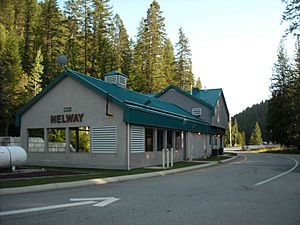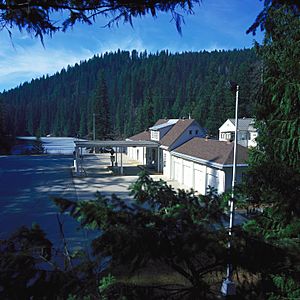Metaline Falls-Nelway Border Crossing facts for kids
Quick facts for kids Metaline Falls-Nelway Crossing |
|
|---|---|

Canada Border Inspection Station at Nelway, BC
|
|
| Location | |
| Country | United States; Canada |
| Location |
|
| Coordinates | 49°00′00″N 117°17′59″W / 48.999979°N 117.299706°W |
| Details | |
| Opened | 1921 |
| US Phone | (509) 446-4421 |
| Canadian Phone | (250) 357-9940 |
| Hours | 8:00AM - 8:00PM |
|
U.S. Border Station
|
|
| NRHP reference No. | 96001634 |
| Added to NRHP | January 31, 1997 |
The Metaline Falls–Nelway Border Crossing is a special place where the United States and Canada meet. It connects the town of Metaline Falls, Washington in the USA with the area near Nelson, British Columbia in Canada. This crossing is a busy spot for people traveling between the two countries. You can reach it using Washington State Route 31 on the American side and British Columbia Highway 6 on the Canadian side.
How the Crossing Began
People have crossed this border for a long time. Canada had a customs office in the Nelson area as early as 1900. However, this specific border crossing did not exist until 1921. That's when the Pend Oreille Highway was finished.
The highway on the Canadian side officially opened in 1923. The name "Nelway" for this area did not appear until 1926. Many people think "Nelway" is a shorter way of saying "Nelson and Spokane highway." It might also come from the Nelson and Fort Sheppard Railway, which was nearby.
Improving the Roads
For many years, the road on the Canadian side was not very good. It was narrow, winding, and rough. This made travel slow and difficult for drivers.
To handle more and more cars, parts of the road were fixed and paved. This work started in 1948 and continued through the 1950s. These improvements made traveling much easier and faster.
The Border Stations
The United States still uses its first permanent border station at this crossing. It was built in the mid-1930s. This building is so important that it was added to the U.S. National Register of Historic Places in 1997. This means it is a special historic site.
Canada built a new border station in 1951. They replaced it again in 2000 with an even newer building. Today, many tourists use this crossing. They often explore the International Selkirk Loop, which is a scenic route for travelers.


